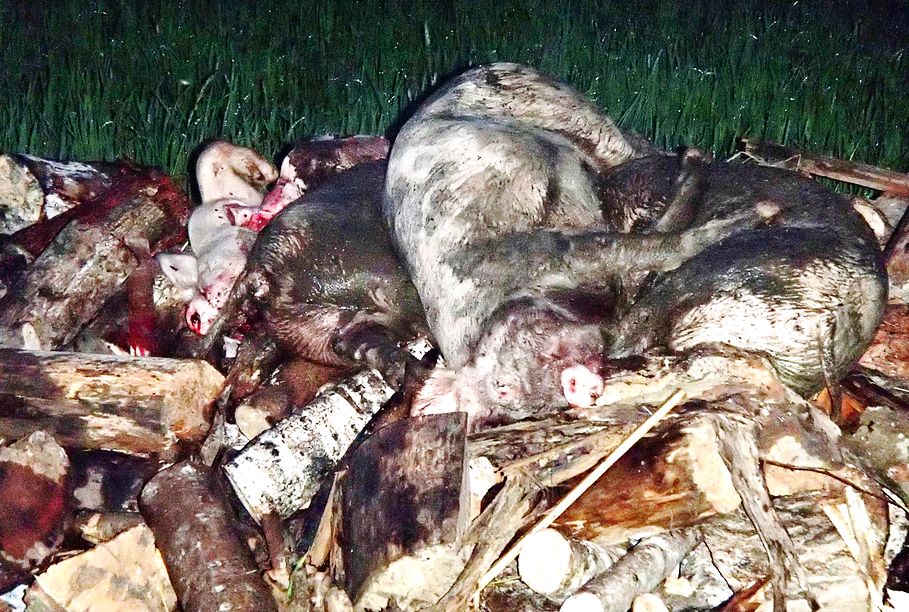Local governments are coming up against ever new problems during this unprecedented veterinary health crisis, not least among them where to get the proper equipment to incinerate all of the dead wild boar and domestic pigs, which are forbidden from being transported outside the declared emergency territories now under the strict control regime.
For instance, in Dagda district a makeshift crematorium has been set up in an open field for wild boar carcasses and pork byproducts, approved by local environmental health service workers. A fence around the site is planned. On Tuesday 41 pigs from a nearby farm where the swine fever was confirmed had to be burned here.
Local government leader Sandra Viskure agrees more serious equipment is needed to deal with the dead animals properly, both from a safety and ethical perspective. “We’ve put up a concrete slab the animals are placed on and burned together with firewood. Of course we have people working on site, hired for this job. We’ve got to get rid of these carcasses, because many are infected. The heat from the fires is just intense and this is really hard work for these people. We haven’t even begun to cover the ethical side, because it’s quite unpleasant for the master of the homestead – to have to watch his whole herd get burned,” she described.
Deputy director of Daugavpils district Aleksandrs Aizbalts agreed the culling process has brought some “pain.” Two cremating sites are only now being set up, but there’s been trouble recruiting workers to man them. The local government lacks free territories to dedicate to the burying of the byproducts, but it’s difficult to come to agreement with local property owners to use their suitable tracts. It has sought mobile burning units from Poland.
“Unfortunately Poland has none to spare, but their law requires all meat processing facilities to have their own crematorium. These are problems the Agriculture Ministry needs to think about. In other countries they have special equipment, protective clothing and training for the burns. We have nothing of the kind and don’t know where to get it,” Aizbalts said.
On its part the PVD is trying to arrange for loans of mobile crematoria from other countries’ veterinary health services, which would be a safer alternative to currently improvised solutions.
According to senior expert Martins Serzants of the PVD’s Department of Veterinary Supervision, “the Danes have responded as willing to help us out.”
“Now it’s a question of how fast the legal issues can be resolved. If it’s even possible. In any case such mobile units are a possibility that Latvia could use too. But then in times of peace it’s not put to any use and sits in a garage somewhere. But, as it turns out – when a situation like this arises, this sort of investment would have paid off for Latvia,” he went on to say.
Blood samples are tested for the state at the public Institute of Food Safety, Animal Health and Environment – BIOR labs. The number of analyses has grown so quickly that workers are being called back from vacations and taking shifts round the clock and through the weekends. Each lab test costs about 60 euros, which is covered by state budget funding so farmers do not suffer additional hardship.
BIOR director Aivars Berzins said the funding is sufficient, but was hard-pressed to say for how long it might have to last.
“If we look at the flow of testing we must realize that increased numbers of analyses may cause the funding to fall short. We will do all we can, we’re ready for crises, but we need to follow procedures to react properly and in time,” he said.
As of Tuesday the PVD had confirmed five infected domestic pigs and 22 wild boar in Latgale province. Hunting wild boar in and around the border zones with Belarus is being discouraged.
PVD Veterinary Supervision Department head Edvins Olsevskis warned against “driving boar through the woods, taking extra shots at them, this will only spread the disease to wider areas,” he warned.
“Fine, they may run back toward the Belarus side, but they just as well could go the opposite way, god forbid. We’re not talking about more intensive hunting, we only need wild boar specimens and information about any dead ones discovered,” Olsevskis explained.
As reported, the government approved €1,5m euros in emergency budget funding Tuesday to compensate pig farmers for losses they will surely suffer this year. Of the five homesteads where culls had to be ordered, only two have applied for the compensation so far.
“For feeding pigs there will be from 86 to 125 euros compensation, for piglets 30 euros, for a sow about 200 euros,” the PVD spokesman specified.
But Olsevskis added that “the disease doesn’t fly on the air – there is a lack of biological safety measures. Disinfection mats are not being used, the same boots are worn all over the place, they let anybody whomsoever into the barns.” Along with earmarking the compensation funds, the government has also established strict biosecurity requirements for pig-raising farmers hoping to save their herds in time. These must be put into effect by July 22 to avoid being subject to an automatic culling order.
Emergency measures including a 40-kilometer-wide quarantine zone, restrictions on movement of animals and intensive inspections are in place throughout many Latgale districts and parishes until October 1.
While harmless to humans, African swine fever is deadly and highly contagious among pigs, posing a serious threat to the global pork industry


























